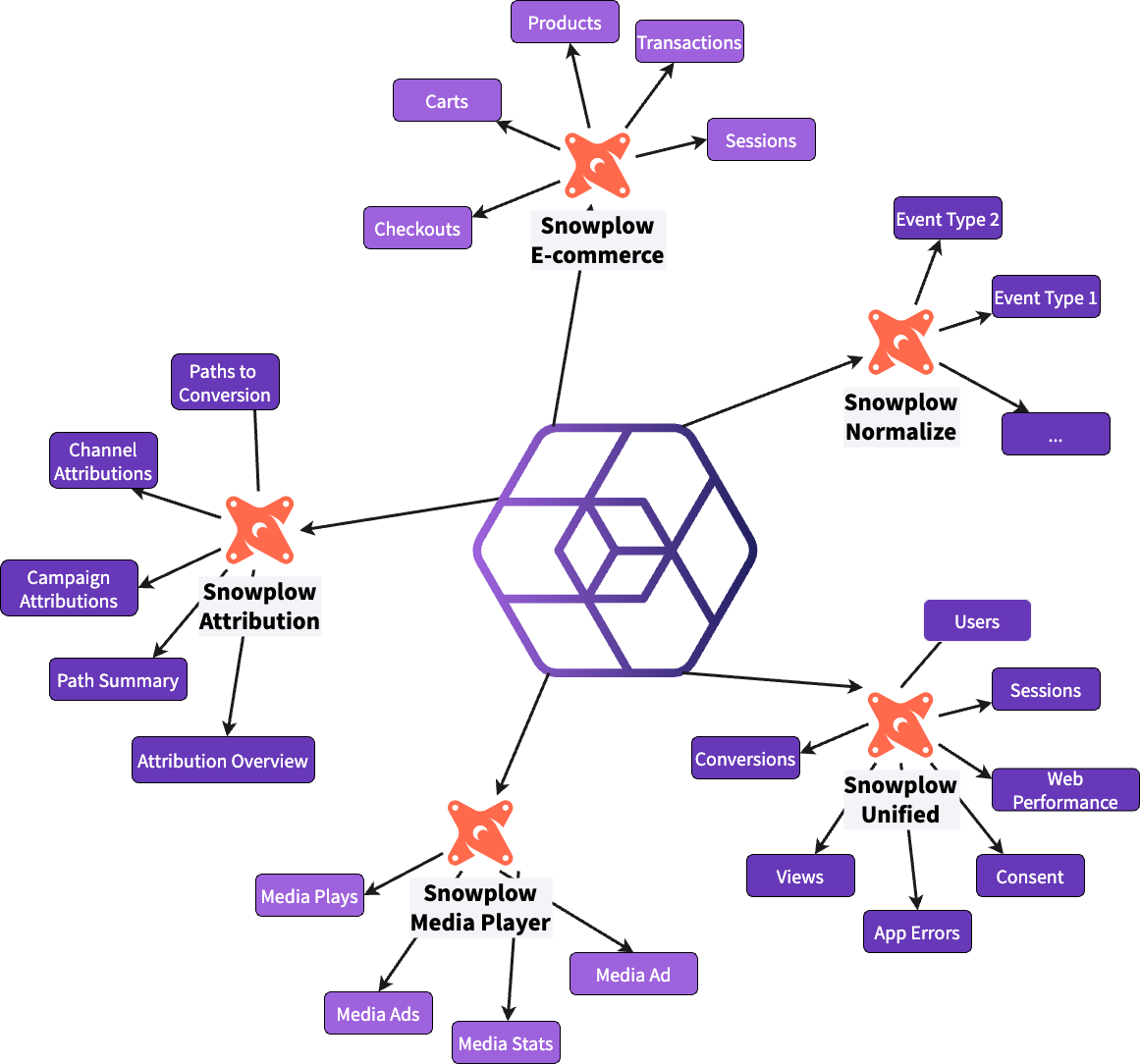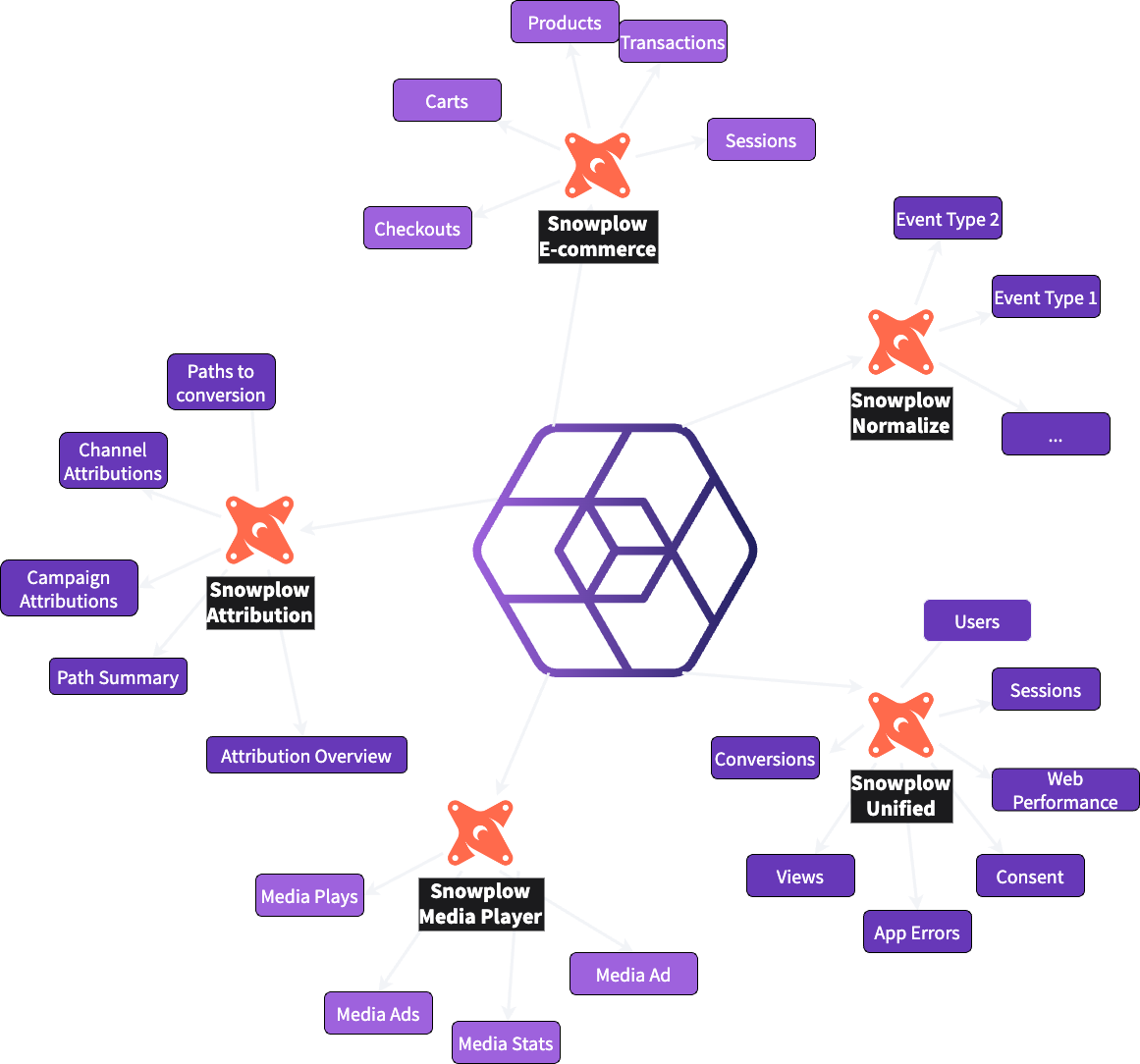Model your data with dbt
dbt enables analytics engineers to transform data in their warehouses by simply writing select statements. Snowplow has written and maintain a number of dbt packages to model your snowplow data for various purposes and produce derived tables for use in analytics, AI, ML, BI, or reverse ETL tools.
Using Snowplow's dbt packages means you can draw insight and value from your data quicker, easier, and cheaper than building your own modeling from scratch.


To set up dbt, Snowplow Self-Hosted users can start with the dbt User Guide and then we have prepared some introduction videos for working with the Snowplow dbt packages.
For Snowplow CDI customers, dbt projects can be configured and scheduled in the console meaning you can get started running dbt models alongside your Snowplow pipelines.
Snowplow dbt Packages
Our dbt packages are available under a mix of licenses. For more information about how to get access to these packages, please contact us by requesting a demo if you are new to Snowplow or by reaching out to our support team.
Our dbt packages come with powerful built-in features such as an optimization to the incremental materialization to save you cost on warehouse compute resources compared to the standard method, a custom incremental logic to ensure we process just the required data for each run and keep your models in sync, plus the ability to build your own custom models using both of these!
There are 4 core snowplow dbt packages:
- Snowplow Unified Digital (dbt model docs): for modeling your web and mobile data for page and screen views, sessions, users, and consent
- Snowplow Media Player (dbt model docs): for modeling your media elements for play statistics
- Snowplow E-commerce (dbt model docs): for modeling your E-commerce interactions across carts, products, checkouts, and transactions
- Snowplow Attribution (dbt model docs): used for Attribution Modeling with Snowplow
We also have 2 utility packages:
- Snowplow Normalize package that makes it easy for you to build models that transform your events data into a different structure that may be better suited for downstream consumers
- Snowplow Utils contains all our shared macros and features used across our packages
There are also 3 legacy dbt packages for web, mobile (superseded by unified) and fractribution (superseeded by attribution):
- Snowplow Web (dbt model docs): for modeling your web data for page views, sessions, users, and consent
- Snowplow Mobile (dbt model docs): for modeling your mobile app data for screen views, sessions, users, and crashes
- Snowplow Fractribution (dbt model docs): used for Attribution Modeling with Snowplow
Each package comes with a set of standard models to take your Snowplow tracker data and produce tables aggregated to different levels, or to perform analysis for you. You can also add your own models on top, see the page on custom modules for more information on how to do this.
Package Versions & dbt Compatibility
Starting with v1.0.0, Snowplow dbt packages adopt stricter syntax requirements introduced in dbt Core ≥ 1.10.6 (for example, nested generic test arguments). Earlier dbt versions are not supported from this release onward. Additionally, for Redshift users only, redshift-adapters 1.10 is the minimum requirement going forward.
Snowplow maintains two active release lines:
- v1.x (latest) – recommended for all users, it is where ongoing development occurs
- v0.x (maintenance) – receives critical bug fixes only, where possible
For users upgrading from v0.x to v1.x, see our migration guides
Note on dbt Fusion
While these packages are architecturally compatible with the dbt Fusion engine, Snowplow packages are not officially supported on dbt Fusion at this time. Limited testing may be possible using the --no-version-check flag. Behavior can be fragile, particularly during full-refreshes or when introducing new models, and is under investigation.
The supported data warehouses per version can be seen below:
- Snowplow Unified Digital
- Snowplow Media Player
- Snowplow Normalize
- Snowplow Ecommerce
- Snowplow Attribution
| snowplow-unified version | dbt versions | BigQuery | Databricks | Redshift | Snowflake | Postgres | Spark |
|---|---|---|---|---|---|---|---|
| 1.0.0 | >=1.10.6 to <2.0.0 | ✅ | ✅ | ✅ | ✅ | ✅ | ✅ |
| 0.4.5 | >=1.6.0 to <2.0.0 | ✅ | ✅ | ✅ | ✅ | ✅ | ❌ |
| snowplow-media-player version | snowplow-web version | dbt versions | BigQuery | Databricks | Redshift | Snowflake | Postgres | Spark |
|---|---|---|---|---|---|---|---|---|
| 0.9.4 | N/A | >=1.4.0 to <2.0.0 | ✅ | ✅ | ✅ | ✅ | ✅ | ✅ |
| 0.8.0 | N/A | >=1.4.0 to <2.0.0 | ✅ | ✅ | ✅ | ✅ | ✅ | ❌ |
| 0.5.3 | >=0.14.0 to <0.16.0 | >=1.4.0 to <2.0.0 | ✅ | ✅ | ✅ | ✅ | ✅ | ❌ |
| 0.4.2 | >=0.13.0 to <0.14.0 | >=1.3.0 to <2.0.0 | ✅ | ✅ | ✅ | ✅ | ✅ | ❌ |
| 0.4.1 | >=0.12.0 to <0.13.0 | >=1.3.0 to <2.0.0 | ✅ | ✅ | ✅ | ✅ | ✅ | ❌ |
| 0.3.4 | >=0.9.0 to <0.12.0 | >=1.0.0 to <1.3.0 | ✅ | ✅ | ✅ | ✅ | ✅ | ❌ |
| 0.1.0 | >=0.6.0 to <0.7.0 | >=0.20.0 to <1.1.0 | ❌ | ❌ | ✅ | ❌ | ✅ | ❌ |
| snowplow-normalize version | dbt versions | BigQuery | Databricks | Redshift | Snowflake | Postgres | Spark |
|---|---|---|---|---|---|---|---|
| 0.4.1 | >=1.4.0 to <2.0.0 | ✅ | ✅ | ❌ | ✅ | ❌ | ✅ |
| 0.3.5 | >=1.4.0 to <2.0.0 | ✅ | ✅ | ❌ | ✅ | ❌ | ❌ |
| 0.2.3 | >=1.3.0 to <2.0.0 | ✅ | ✅ | ❌ | ✅ | ❌ | ❌ |
| 0.1.0 | >=1.0.0 to <2.0.0 | ✅ | ✅ | ❌ | ✅ | ❌ | ❌ |
| snowplow-ecommerce version | dbt versions | BigQuery | Databricks | Redshift | Snowflake | Postgres | Spark |
|---|---|---|---|---|---|---|---|
| 0.9.3 | >=1.4.0 to <2.0.0 | ✅ | ✅ | ✅ | ✅ | ⚠️ | ✅ |
| 0.8.2 | >=1.4.0 to <2.0.0 | ✅ | ✅ | ✅ | ✅ | ⚠️ | ❌ |
| 0.3.0 | >=1.3.0 to <2.0.0 | ✅ | ✅ | ❌ | ✅ | ❌ | ❌ |
| 0.2.1 | >=1.0.0 to <2.0.0 | ✅ | ✅ | ❌ | ✅ | ❌ | ❌ |
Postgres is technically supported in the models within the package, however one of the contexts’ names is too long to be loaded via the Postgres Loader.
| snowplow-attribution version | dbt versions | BigQuery | Databricks | Redshift | Snowflake | Postgres | Spark |
|---|---|---|---|---|---|---|---|
| 0.5.1 | >=1.6.0 to <2.0.0 | ✅ | ✅ | ✅ | ✅ | ❌ | ✅ |
| 0.3.0 | >=1.6.0 to <2.0.0 | ✅ | ✅ | ✅ | ✅ | ❌ | ❌ |
dbt Version Compatibility Checker
You may be using other dbt packages that require you to use a specific version of dbt, or a specific version of the dbt_utils package. Or you simply may not wish to upgrade your existing setup.
Here’s a way to check the latest version of our packages you can install for a given setup. Simply enter your dbt version and (optionally) dbt_utils version below.
Please enter a valid dbt version.